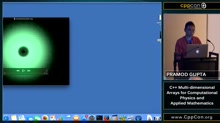C++ Today--Bjarne Stroustrup
An interesting video to watch!
C++ Today
by Bjarne Stroustrup
Summary of the video:
During a short visit to College on 13 May 2016, Bjarne gave a talk describing what C++ is today (May 2016, C++14) and how it can be used well. He will focus on ISO standard C++ and the way it is developing.

 News from Visual Studio:
News from Visual Studio: Have you registered for CppCon 2016 in September? Don’t delay –
Have you registered for CppCon 2016 in September? Don’t delay –  Have you registered for CppCon 2016 in September? Don’t delay –
Have you registered for CppCon 2016 in September? Don’t delay –  Have you registered for CppCon 2016 in September? Don’t delay –
Have you registered for CppCon 2016 in September? Don’t delay –